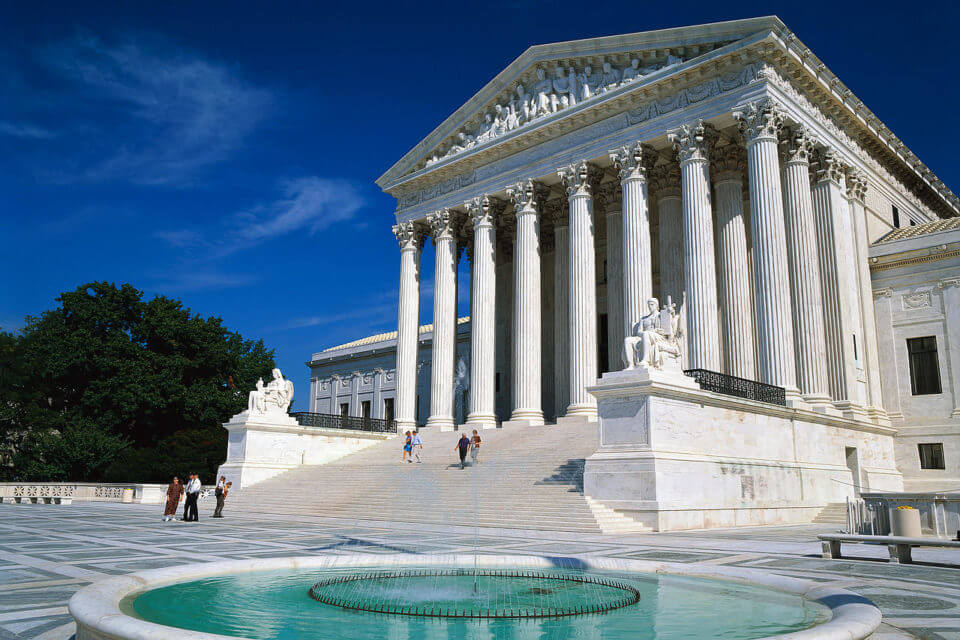
“While the task of critique is always important, it is not sufficient if the expectation is simply that deconstructing regimes of marginalization will immanently lead to the emergence of some vaguely conceived egalitarian society.”
“In a world of democracies, in a world where the great projects that have set humanity on fire are the projects of the emancipation of individuals from entrenched social division and hierarchy; in such a world individuals must never be puppets or prisoners of the societies or cultures into which they have been born.” Roberto Unger
With the recent controversies over Supreme Court appointments, it is a fitting time to analyze the strengths and limitations of the critical legal studies movement, which is often held up as a boogeyman of solid legal analysis by a number of critics on the right.
Many conservatives argue that critical legal thinking has resulted in collapsing standards for the legal profession. Victor Hanson of The National Review wrote that critical legal theory will collapse support for law and order. In Explaining Postmodernism, Stephen Hicks lumps critical legal theory with other postmodern movements dedicated to undermining reason, individualism, and support for liberal values. Others claim that critical legal thinking is destroying the very idea that there can be “truth” in legal analysis. These fears are often invoked to justify the appointment of conservatives justices who will interpret the original meaning of the law.
These expressions of anxiety belie the fact that critical legal thinking is more often parodied and ridiculed than engaged with seriously. This piece is meant to buck this trend by providing a relatively short introduction to the work of major critical legal theorists and their arguments. As we shall see, the arguments of the critical legal theorists are often quite radical. They claim that the language of law, far from being clear and easily interpreted, is often highly ambiguous. Legal officials, many of whom come from powerful backgrounds, therefore, cannot merely interpret the law in a neutral manner. Instead, they interpret it to advance their group interests and marginalize the less powerful. After trying to present their arguments as carefully as possible, I will conclude by pointing out some of the problems I have with critical legal thinking. I will also suggest some ways these might be ameliorated through the adoption of a more ambitious and constructive approach to morality and the law.
What is Critical Legal Studies?
Critical legal studies developed out of the pragmatic school of the American legal realists. This includes luminaries such as Justice Oliver Wendell Holmes and Justice Jerome Franky. These pragmatists argued that oftentimes the meaning of the law was ambiguous, which meant that judges most effectively legislate from the bench if they are to do their job. The critical legal theorists accepted many of the epistemological positions of the legal realists, but gave the earlier tradition a critical twist.
Though there is some debate about the topic, most believe critical legal studies emerged in the mid-1970s with the publication of a sequence of classic texts, including Duncan Kennedy’s “Form and Substance in Private Law Adjudication” and Roberto Unger’s Knowledge and Politics. These texts secured immediate academic fame (and infamy) for their authors, and inaugurated a new school of legal thought in Anglo-American law schools. By the 1980s, critical legal studies was one of the most prominent and certainly the most infamous movement in legal philosophy, inspiring both passionate advocacy and derisive dismissal.
Despite this brief moment of ascendancy, enthusiasm for critical legal studies petered out by the end of the decade. Many scholars on the left became unhappy with the generally Marxist perspective adopted by most critical legal scholars. While they were happy to retain the overall critical outlook toward the law, some wished to examine other intersectional forms of marginalization. For these reasons, critical legal theory branched out into a broader array of interpretive lenses and disciplines, such as critical race approaches to law, socio-legal studies, and so on.
Critical legal scholars differed widely in their interests and focus, often deploying deconstructive tools to examine a broad array of topics in the law. Nonetheless, most critical legal scholars held to a few central tenants.
The first tenant was some variation of what is often called the indeterminacy thesis. This thesis was inspired by developments in the philosophy of language and linguistics, where many argued that it was far less clear what words meant than we had often supposed. These arguments had an influence on the thinking of the critical legal theorists, who came to argue that many or most legal questions did not actually beget an objective answer because it was often not clear what the language of law truly meant. The text of the law was actually ridden with ambiguities which could not be resolved through the application of the various formalist modes of analysis taught at law schools, most of which expressly or implicitly presumed the tenability of some variant of legal positivism.
This led to the second main tenant: since the meaning of law is not always clear, legal practitioners cannot objectively interpret it. This has political consequences for the critical legal theorists. As much of the law did not lend itself to an objective interpretation, this meant that legal practitioners and institutions did not actually engage in an ideologically neutral enterprise. Since the law is not self-interpreting and does not beget an objective determination, this begs the question of how legal practitioners and institutions decide what the law shall be and how to apply it in any given circumstance. The answer given by most critical legal scholars is that legal practitioners and institutions resolve ambiguities by interpreting the law in line with their ideological preferences. These preferences were determined by the socio-historical situation of the legal practitioner in question; their economic interests, psychology, educational background, class position and so on.
Finally, the third tenant, and the one most conservative commentators take issue with. This is the argument that law serves to marginalize weaker members of society. Legal officials, most of whom came from elite backgrounds, tended to interpret the law in order to advance their interests and exploit the less powerful. How, and why, they do this is where critical legal scholars deviated most formidably. Many, such as the early Duncan Kennedy and Michael Mandel took a fairly orthodox Marxist line on this point. Others, such as Roberto Unger, developed more original normative conceptions to justify their opposition to the contemporary status quo. But regardless of their particular arguments, the outcome was largely the same. Critical legal scholars believed that since what counted as law was largely the decision of often privileged legal practitioners who emerged out of elite institutions, the law tended to serve their interests by marginalizing other groups in society. Most noticeably, this included mitigating the capacity of marginalized groups to use the law in order to advance a more progressive agenda. Law, therefore, was fundamentally a reactionary force in society. This meant the progressives should either use it with caution as a double-edged sword, or refrain from pushing their agenda through the law wholesale.
Critical Legal Studies and Moral Arguments
This last point is problematic for those of us who believe that human rights can be a useful tool for advancing a progressive agenda. Many critical legal theorists have written about rights, but almost always in a skeptical fashion. Rights are seen as just one more tool for elites to advance a particular ideology, which further entrenches power. This skepticism about rights isn’t isolated. It is part of a more general tendency on the part of many critical legal theorists to avoid putting forward constructive moral arguments. Instead, as the name suggests, they limit themselves to providing critiques of the status quo, or “trashing” as it is sometimes called. There can indeed be a great deal of value to such activities. But I think we must also be careful to recognize the limits of this critical disposition, especially when considering how to achieve real social change.
“Much like characters in a work by Samuel Beckett, naïve progressives put their faith in rights discourse only to realize time and again that it can only serve to reinforce the property entitlements of the rich and powerful.”
For most critical theorists, their skepticism toward the law and legal institutions extended to most accounts of rights and rights discourse. In his earlier work, Unger dismissed liberal rights for flowing from a fundamentally self-contradictory psychology. This meant they served to reinforce a fundamentally deficient form of society, where abstract individualism took the place of genuine self-authorship and democratic community building. For Costas Douzinas, human rights are a cultural fetishism which can distract from more pertinent efforts to develop a new critique of political economy and state institutions. For Allan Hutchinson and Michal Mandel, rights promise a utopian future which is never to arrive. Much like characters in a work by Samuel Beckett, naïve progressives put their faith in rights discourse only to realize time and again that it can only serve to reinforce the property entitlements of the rich and powerful. Given this, it is far wiser to put one’s faith in politics. These opinions are also echoed by Duncan Kennedy, who worries that appeals to right will limit our capacity to engage in Marxist and post-modern critiques of the state and marginalizing institutions. For these reasons, progressives should look upon rights and rights discourse with a fair amount of skepticism.
Conclusion: The Limits of Critique
There is much to admire in the critical legal examinations, including their critiques of rights discourse and affiliated conceptions such as human dignity. However, I feel that much of this goes too far. With the exception of Roberto Unger, many critical legal scholars have been largely focused on demonstrating the flaws and dangers inherent within rights discourse and its affiliated conceptions. Few of them have been willing to give constructive suggestions on what should replace it. Indeed, most critical theorists ultimately come down from their critical heights to saying that one should use the law to try and achieve a more egalitarian society while always being cognizant of the dangers of using the master’s tools to deconstruct his house. What this egalitarian society would look like, let alone why it is a worthwhile aspiration, is never spelled out in much concrete detail. Sadly, this has also been true of most of their intellectual descendants in various socio-legal and legal studies movements.
I do not think this tendency to engage exclusively in trashing is an adequate response to the needs of the current era. Indeed, there is a suspicious quality to attempting to evade what Rawls characterizes as the burdens of moral judgment by claiming to be engaging exclusively in a critical appraisal of law without invoking competing moral norms. The collapse of grand narrative theories, such as Marxism, has engendered a strangely conservative leftist approach to law that takes identity and protecting it from invasive colonization by neo-liberal capitalism and other hegemonic forces to be the goal of critical scholarship. I believe this is a worthy goal. But taking identity as it exists to be the sole locus of normativity undermines a commitment to dignified agency and context transcendence that I see as necessary for the advancement of any true critical progressive agenda. Individuals should be made capable of transcending and shaping the socio-historical contexts in which they exist, not just shielded from colonization by other and more insidious external forces. In other words, we should look to concretely respect and amplify the dignity of all individuals by increasing their general capacity for dignified self-authorship.
This approach of engaging in critique from nowhere doesn’t strike me as sincere. It would be more accurate to characterize many of these critical legal and affiliated efforts as invoking relatively thin sets of norms oriented around achieving a more egalitarian society. But the broad contours of what this egalitarian society would and should be are rarely spelt out.
“While the task of critique is important, it is not sufficient if the expectation is simply that deconstructing regimes of marginalization will immanently lead to the emergence of some vaguely conceived egalitarian society.”
Instead one is left with a rhetorical appeal to fairly stock set leftist ideas without them being recombined or reconceived in a manner that can inspire or orient concrete and constructive action. I do not think this is adequate. Trying to avoid the burdens of moral judgment by invoking a thin set of norms, rather than articulating a broad and concrete set of aspirational goals, strikes me as demonstrating a failure of the imagination. While the task of critique is important, it is not sufficient if the expectation is simply that deconstructing regimes of marginalization will immanently lead to the emergence of some vaguely conceived egalitarian society. This includes looking to how law can be reoriented along more progressive lines.
I think one of the ways to achieve this would be to take the arguments of constructive moral theorists more seriously, especially those in the analytical tradition. The continuous attraction of what I call post-modern philosophies too many critical legal theorists is understandable, but it has increasingly become a burden to putting forward more constructive moral arguments. Here, the tools provided by thinkers like John Rawls, Martha Nussbaum, and Derek Parfit could we a treasure trove of insight. They could also us provide more systematic alternatives to the status quo that might actually inspire people to push for a more egalitarian political system.
Should this not be palatable, we could also look more closely at the work of Roberto Unger. He remains the one critical legal theorist of note who has moved far beyond “trashing” and has provided more ambitious arguments about what a progressive and democratic society should look like, for instance in his great and short book The Left Alternative.
In any case, during a tumultuous time marked by the rise and emergence of post-modern conservative movements across the developed world, it is an ideal opportunity for progressive thinkers—in law and other disciplines—to aspire to bolder heights. As Unger puts it:
“The single idea that resounds on every page of [my] book is the idea of the infinity of the human spirit, in the individual as well as in humanity.”
Matt McManus completed his Ph.D. in socio-legal studies at York University. He is currently Professor of Politics and International Relations at TEC De Monterrey. Matt can be reached at garion9@yorku.ca.










